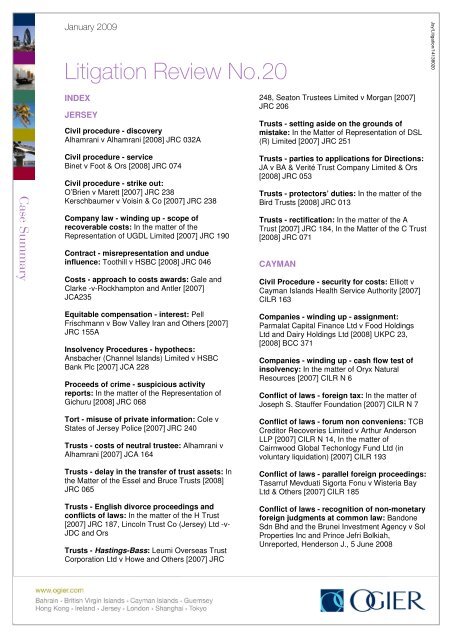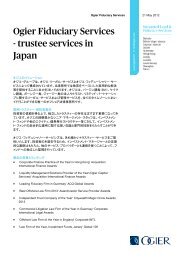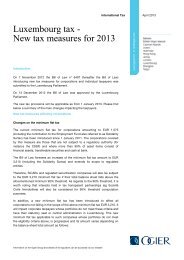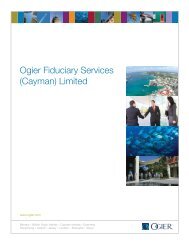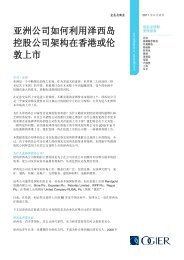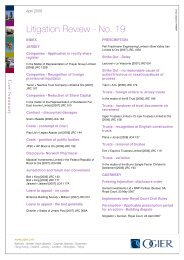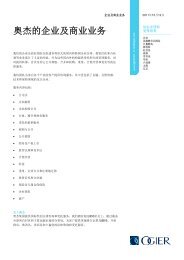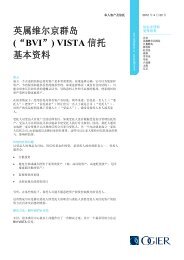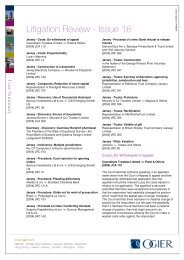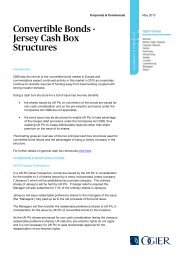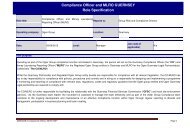Litigation Review No.20 - Ogier
Litigation Review No.20 - Ogier
Litigation Review No.20 - Ogier
You also want an ePaper? Increase the reach of your titles
YUMPU automatically turns print PDFs into web optimized ePapers that Google loves.
January 2009<strong>Litigation</strong> <strong>Review</strong> <strong>No.20</strong>Jsy/<strong>Litigation</strong>/14138020Case SummaryINDEXJERSEYCivil procedure - discoveryAlhamrani v Alhamrani [2008] JRC 032ACivil procedure - serviceBinet v Foot & Ors [2008] JRC 074Civil procedure - strike out:O’Brien v Marett [2007] JRC 238Kerschbaumer v Voisin & Co [2007] JRC 238Company law - winding up - scope ofrecoverable costs: In the matter of theRepresentation of UGDL Limited [2007] JRC 190Contract - misrepresentation and undueinfluence: Toothill v HSBC [2008] JRC 046Costs - approach to costs awards: Gale andClarke -v-Rockhampton and Antler [2007]JCA235Equitable compensation - interest: PellFrischmann v Bow Valley Iran and Others [2007]JRC 155AInsolvency Procedures - hypothecs:Ansbacher (Channel Islands) Limited v HSBCBank Plc [2007] JCA 228Proceeds of crime - suspicious activityreports: In the matter of the Representation ofGichuru [2008] JRC 068Tort - misuse of private information: Cole vStates of Jersey Police [2007] JRC 240Trusts - costs of neutral trustee: Alhamrani vAlhamrani [2007] JCA 164Trusts - delay in the transfer of trust assets: Inthe Matter of the Essel and Bruce Trusts [2008]JRC 065Trusts - English divorce proceedings andconflicts of laws: In the matter of the H Trust[2007] JRC 187, Lincoln Trust Co (Jersey) Ltd -v-JDC and OrsTrusts - Hastings-Bass: Leumi Overseas TrustCorporation Ltd v Howe and Others [2007] JRC248, Seaton Trustees Limited v Morgan [2007]JRC 206Trusts - setting aside on the grounds ofmistake: In the Matter of Representation of DSL(R) Limited [2007] JRC 251Trusts - parties to applications for Directions:JA v BA & Verité Trust Company Limited & Ors[2008] JRC 053Trusts - protectors’ duties: In the matter of theBird Trusts [2008] JRC 013Trusts - rectification: In the matter of the ATrust [2007] JRC 184, In the Matter of the C Trust[2008] JRC 071CAYMANCivil Procedure - security for costs: Elliott vCayman Islands Health Service Authority [2007]CILR 163Companies - winding up - assignment:Parmalat Capital Finance Ltd v Food HoldingsLtd and Dairy Holdings Ltd [2008] UKPC 23,[2008] BCC 371Companies - winding up - cash flow test ofinsolvency: In the matter of Oryx NaturalResources [2007] CILR N 6Conflict of laws - foreign tax: In the matter ofJoseph S. Stauffer Foundation [2007] CILR N 7Conflict of laws - forum non conveniens: TCBCreditor Recoveries Limited v Arthur AndersonLLP [2007] CILR N 14, In the matter ofCairnwood Global Techonlogy Fund Ltd (involuntary liquidation) [2007] CILR 193Conflict of laws - parallel foreign proceedings:Tasarruf Mevduati Sigorta Fonu v Wisteria BayLtd & Others [2007] CILR 185Conflict of laws - recognition of non-monetaryforeign judgments at common law: BandoneSdn Bhd and the Brunei Investment Agency v SolProperties Inc and Prince Jefri Bolkiah,Unreported, Henderson J., 5 June 2008
January 2009<strong>Litigation</strong> <strong>Review</strong> <strong>No.20</strong>Case SummaryTrusts - disclaimer of interest andremuneration of protector: In the matter of theCircle Trust, HSBC International Trustee Ltd vWong [2007] CILR 225GUERNSEYTrusts - variation and legal disability: In re theH Trust, Royal Court of Guernsey, 29 August2007, In re X, Royal Court of Guernsey, 3December 2007BVICompanies - defining appropriation of shares:Alfa Telecom Turkey Ltd v Cukurova FinanceInternational Ltd & Cukurova Holdings AS (BritishVirgin Islands) 2008Insolvency - setting aside a statutory demand:Rolen Pty Limited v Firepower Holdings GroupLimited (unreported)JERSEYCivil procedure - discovery: Alhamrani vAlhamrani [2008] JRC 032AThe Court had to consider whether it hadjurisdiction in principle to order a party to anaction to make discovery of documents beyondthose relating to issues in which that party wasdirectly involved and, if so, how such jurisdictionshould be exercised in the instant case. TheCourt held that the wording of Order 6, rule 17 ofthe Royal Court Rules 2004 provided that anyparty could be ordered to produce a list ofdocuments relating to any matter in question inthe proceedings. The Court found that thissupported the wider view that a party could beordered to make discovery of documents beyondthe issues in which he was involved and it wasdesirable that the Court should have the power toorder discovery on this wider basis where theinterests of justice so require. Concerns aboutunfairly onerous obligations being placed on aparty from whom discovery was sought byanother party in relation to matters not directly incontention between them could be controlled bythe Court as a matter of discretion. Nevertheless,in general it would be right for a court to approachan application for discovery of documents fromanother party where no material issue directlyarises between them with caution.Civil procedure - service: Binet v Foot &Ors [2008] JRC 074The plaintiff brought proceedings against fourdefendants, including a BVI company. Theplaintiff’s advocate sought to effect service on theBVI company’s Jersey advocate pursuant to anearlier undertaking which the company’sadvocate had given, namely that if negotiationsbetween the parties did not bear fruit, he wouldaccept service of the proceedings on behalf of allfour defendants. Subsequently, when theplaintiff’s advocate sought to serve, thecompany’s advocate indicated that hisacceptance of service on its behalf would beunder protest as to jurisdiction.The Court found that the undertaking given by thecompany’s advocate to accept service on itsbehalf was not conditional, despite the fact thatbefore he had given it, he had purported toreserve the company’s right to contest thejurisdiction. The Court held that the undertakingitself did not refer to jurisdictional issues and wasunqualified. In the Court’s view, anuncommunicated intention to make anundertaking conditional could not be effective toimpose such a condition on the recipient of theundertaking. The undertaking did not reserve theright to challenge the jurisdiction and it followedthat service had been validly effected within thejurisdiction upon the BVI company.Civil procedure - strike out and settingaside of consent orders: O’Brien v Marett[2007] JRC 238In this application, the Petitioner in theproceedings sought an order striking out part of asummons issued by a Third Party in which anapplication was made (inter alia) to set asidecertain costs, consent and directions orders onthe grounds that the Third Party had at the timeof the orders been badly advised, the ordersthemselves were unfair and had not been agreedto.The Court held that the Court had jurisdictionunder Rule 6 and its inherent jurisdiction to strikeout any process. On the merits of the application,the Court granted the relief sought and struck outthe relevant part of the summons seeking to setaside the 3 orders. It held that the Court wasfunctus officio in relation to the costs and theThird Party’s remedy was to appeal; directionsorders could be revisited by way of further casemanagement applications; and a consent ordercould only be set aside on certain limited groundswhich were not present.ADMIN-14138020-2
January 2009<strong>Litigation</strong> <strong>Review</strong> <strong>No.20</strong>Case SummaryIn relation to the setting aside of a consent order,the Court adopted the English law test, assummarised in Rayden and Jackson on Divorceand Family Matters: namely fraud, mistake, nondisclosureor misrepresentation, or new eventsoccurring since the order was made invalidatingthe basis for the order. On the affidavit evidenceof the parties the Court concluded that there wasno mistake and the parties had eachunequivocally instructed their lawyers to makethe concessions that lead to the consent order.As a result, the Third Party’s application could notcome within the narrow category where a consentorder could be set aside and the Petitioner’sapplication to strike out parts of the Third Party’sapplication was granted.Kerschbaumer v Voisin & Co [2007] JRC238This decision related to an application to strikeout the Plaintiff’s Order of Justice on the groundsof inordinate and inexcusable delay. An Order ofJustice seeking damages from a GovernmentCommittee in relation to property damage hadbeen struck out in 2001 for delay. In 2005 a newOrder of Justice was served on the defendants(the former advocates acting on the originalclaim) seeking damages for negligence. In threeyears the litigation had not progressed beyondpleadings. In the application before the Court (onappeal from a decision of the Judicial Greffierrefusing the application) the Royal Court upheldthe ruling below, finding that whilst the delay wasinordinate, it was excusable (based on thePlaintiff’s advocate’s illness and then departurefrom the firm acting).Leave to appeal to the Court of Appeal wassubsequently granted by the Royal Court, it beingconsidered appropriate for the Court of Appeal toconsider the state of Jersey law on the questionof whether inexcusability and/or prejudice is anecessary ingredient of the test for striking forwant of prosecution in light of recent Jerseydecisions (Ybanez - see <strong>Litigation</strong> <strong>Review</strong> 19)and the move in England away from the testoriginally laid down in Birkett v James. Whilst onits facts the case is not especially noteworthy, itcould well lead to a Court of Appeal ruling in thisimportant area of case management.Company law - winding up - scope ofrecoverable costs: In the Matter of theRepresentation of the Directors of UGDJLimited [2007] JRC 190The Court had to decide whether the feescharged by the directors of an insolvent companyof and incidental to an application to the RoyalCourt for directions as to who should beappointed liquidator of the company could berecovered as part of the costs of the winding upunder Article 165 of the Companies (Jersey) Law1991. Because there was disagreement betweenthe creditors as to the identity of the liquidatorand the actions of the directors in seeking thedirections of the Court had been encouraged bythe creditors, it was held that this was anexceptional case and it would be wrong not totreat the directors’ own fees as part of the costsof the winding up.Contract - misrepresentation and undueinfluence: Toothill v HSBC [2008] JRC 046In this case, the Deputy Bailiff set out someimportant principles relating to misrepresentationand undue influence as follows:(a) in the area of misrepresentation in thecontractual context, there is no materialdifference between English law and Jerseylaw. A misrepresentation is a false statementof fact, past or present, as distinct (generally)from a statement of opinion, or of intention orof law. A representation may be express orimplied or it may arise out of conduct;(b) he left open the question whether Jersey lawshould recognise the concept of réticencedolosive (or fraudulent or dishonest silence)as operating in wider circumstances thanthose in which English law recognisesexceptions to the general rule that mere nondisclosuredoes not constitutemisrepresentation (e.g. statutory exceptions,insurance contracts which are uberrimaefidei, fiduciary relationships, etc.);(c) the law of undue influence in Jersey is similarto that of English law and the principlesunderlying the decisions in Barclays Bank Plcv O’Brien [1994] 1 AC 180 and Royal Bank ofScotland Plc v Etridge (No. 2) [2002] 2 AC773 are entirely consistent with those ofJersey law, so that a wife seeking to setaside security over the jointly owned homehas to prove that:ADMIN-14138020-2
January 2009<strong>Litigation</strong> <strong>Review</strong> <strong>No.20</strong>Case Summary(i) she was unduly influenced by thehusband to give the security or wasinduced to do so bymisrepresentation on his part;(ii) the bank was put on enquiry as tothe existence of undue influence ormisrepresentation; and(iii) the bank did not take the reasonablesteps laid down by the House ofLords in Etridge to draw the potentialconsequences of giving security toher attention and as a result is fixedwith notice of the undue influenceand/or misrepresentation so that itcannot enforce the security againstthe wife;(d) a bank will be put on enquiry when the wifegives a guarantee for a loan to the husbandor the company through which he conductshis business because such a transaction ison its face disadvantageous to the wife, whoobtains no direct benefit from it. However,where there is a joint loan to the husbandand wife, the wife will normally benefit to thesame extent as the husband and thereforethe bank is not put on enquiry unless it isaware that the loan is being made for thehusband’s purposes instead of their jointpurposes; and(e) there are strong policy grounds for thinkingthat Jersey law on undue influence should bethe same as in England, not least becausemost of the banks in the Island which providefinance for immovable property transactionsare branches of English banks and their stafffollow the same training and procedures asthose followed in England.Costs - approach to costs awards: Galeand Clarke v Rockhampton and Antler[2007] JCA235In this case, the Court of Appeal endorsed theapproach to costs applications in Jerseyproceedings, as outlined in Watkins v Egglishawand others [2002] JLR 1 and in Pell FrischmannEngineering Ltd v Bow Valley Iran Limited andothers [2007] JRC 143, namely: that theoverriding principle is to do justice between theparties; whilst considering which party was“winner” and which “loser” could be appropriate,that was not to be overstated; the discretion aslaid down in Article 2 of the Civil Proceedings(Jersey) Law 1956 is a wide one and ought not tobe treated as fettered by any particular supposedrule or practice, other than that the discretionshould be exercised judicially and broadly inaccordance with the guiding principles referred toin In re Elgindata (No.2) and A.E.I. vPhonographic Performance.Equitable compensation - interest: PellFrischmann v Bow Valley Iran and Others[2007] JRC 155AThe Court dismissed the argument that becausethe judgment awarded in the plaintiff’s favour wasa form of equitable compensation, interest couldnot be awarded under article 2(1) of the Intereston Debts and Damages (Jersey) Law 1996. Itreiterated that the purpose of interest is tocompensate the other party for having been keptout of its money from the date on which the sum(be it a debt, damages or compensation) is due.The starting point for an award of interest was thedate on which the cause of action arose,although the rate of interest awarded by the Courtwas reduced because of the long delay beforeproceedings were commenced by the plaintiff.Insolvency Procedures - judicialhypothecs and priorities in dégrèvement:Ansbacher (Channel Islands) Limited vHSBC Bank Plc [2007] JCA 228Ansbacher agreed to lend up to £700,000 to acouple for their house purchase. It registered theacknowledgement of the debt at the PublicRegistry, thereby obtaining a first judicialhypothec (an accessory right in rem attaching toa debt or obligation). Subsequently, two otherlenders obtained judicial hypothecs in respect ofdebts owed to them by the same couple. Finally,Ansbacher obtained and registered judgment forthe debt of £700,000 and obtained a secondjudicial hypothec in its favour. The question,which arose in the context of a dégrèvement (aform of insolvency process in Jersey whereby acreditor may elect to take the bankrupt’simmovable property and pay off earlierhypothecs, keeping any surplus for himself), waswhether by obtaining a second hypothec,Ansbacher had lost the benefit of its firsthypothec and hence priority for its debt overthose of the intervening lenders.The Court of Appeal held that Ansbacher had lostthe benefit of its first hypothec and held asfollows:(a) the effect of the Loi (1880) sur la PropriêtéFonciére (which governs the creation ofhypothecs) was that if there is a singleunderlying obligation or debt, there can onlyADMIN-14138020-2
January 2009<strong>Litigation</strong> <strong>Review</strong> <strong>No.20</strong>Case Summarybe one judicial hypothec securing such adebt or obligation, because an earlierhypothec loses its effectiveness upon theregistration of a later act or judgment givenwithin that judicial process;(b) this construction accorded with the longstandingunderstanding of Jersey lawyersand it seemed unnatural that a creditorshould have two hypothecs against hisdebtor in respect of the same debt. The Courtheld that there was much force in the RoyalCourt’s finding that the Public Registry musthave been intended to give a fair andaccurate picture of the indebtedness securedagainst the property of the debtor, and thatthe existence of two hypothecs for the samedebt could mislead both current and potentiallenders;(c) in a dégrèvement the holders of hypothecsare called in reverse order, and they have tochoose whether to pay off earlier hypothecsand take the property. Many factors affectthat decision. These may include the level ofearlier debts secured by hypothec andattaching to the property, possibly eventhe value of other properties to which thehypothec attaches, and the value of thedebtor’s immovable property generally. Theexistence of two hypothecs would give thecreditor two bites at the cherry in the form oftwo opportunities (rather than one) to takethe property. There was nothing in the 1880Law to suggest that such disruption wasintended; and(d) it followed that in the dégrèvement in thiscase, Ansbacher would only make anyfinancial recovery of the amount owed to it tothe extent that the value of the house ownedby the debtor couple exceeded the combinedvalue of the amounts owed to other debtors,who had obtained judicial hypothecs afterAnsbacher’s first hypothec but before itssecond.Proceeds of Crime - suspicious activityreports: In the matter of theRepresentation of Gichuru [2008] JRC 068The plaintiff opened a bank account with aninstitution in 1981 and, in 2002, the institutionfiled an SAR. The police declined to give theinstitution consent to make any payments andcontinued to maintain that lack of consent. Theplaintiff then sought an order that the institutionmust pay over the assets.The Court considered that a customer in respectof whose account an SAR has been filed has twooptions:(a) he can submit the police’s refusal of consentto make any payments to judicial review; or(b) he can bring a private law action against thefinancial institution for the return of the funds.In a private law action, the issues for thecourt are likely to be whether the fundsbelong to the customer and, if so, whetherthey are the proceeds of criminal conduct.The Court then considered the extent to whichthe police should be involved if the customerchooses to bring a private law action against theinstitution. It held that the police should notordinarily be convened in private law actions asthere was a real risk of prejudicing investigationsand prosecutions if the police could be forced bythe customer to explain their actions in Courtbefore they were ready to initiate criminalproceedings.In a private law action, the institution is under aduty to contest the customer’s claim and must laybefore the Court all available evidence whichjustifies its suspicion. In order to protect itself,and once the customer has established that hedid deposit the money and has demandedpayment, the institution must prove on thebalance of probabilities that it has the requisitesuspicion, which then entitles it to refuse to payunless the police consent or the Court so orders.The Court also held that the burden then revertsto the customer to prove on the balance ofprobabilities that the funds are not the proceedsof criminal conduct.The Court commented that the current state ofaffairs is capable of causing great hardship andunfairness and recommended that considerationbe given to amending the current legislation so asto avoid the difficulties and potential injustice towhich Jersey’s “informal freeze” system can giverise.Tort - misuse of private information: Colev States of Jersey Police [2007] JRC 240Mr Cole brought proceedings against the Statesof Jersey Police for disclosing details of hiscriminal record. Mr Cole had stated on hisapplication for employment with Jersey Post thathe had no convictions (under the mistaken beliefthat Jersey had, at the time, rehabilitation ofoffenders legislation). Despite the Police havingstated to Jersey Post that disclosure of recordsADMIN-14138020-2
January 2009<strong>Litigation</strong> <strong>Review</strong> <strong>No.20</strong>Case Summarywould be given only if there was consent and anindication as to the lack of rehabilitationlegislation had been given to the personconcerned, the Police did disclose records of MrCole’s prior convictions to Jersey Post. Mr Colesought damages for breach of confidence/misuseof private information.The Royal Court held in favour of Mr Cole, findingthat an action for misuse of private informationthat as existed under English law, formed part ofJersey law. The Court commented that, since the1970s, the English law of tort has governedJersey legal thinking.The Court adopted a 3 issueapproach:(a) that the information was confidential;(b) that the disclosure was unauthorised; and(c) whether disclosure was justified in the publicinterest.The Police accepted that the information wasconfidential. The Court held that disclosure wasunauthorised and not in the public interest. As fordamages for injury to feelings, the Court(adopting English law principles) rejected MrCole’s claim for £75,000, and awarded nominaldamages of £750.Trusts - costs of a neutral trustee:Alhamrani v Alhamrani [2007] JCA 164The Court of Appeal held that in Jersey abeneficiary does not have an automatic right totaxation of the costs and expenses of a neutraltrustee, although there are mechanisms in placeto protect a beneficiary’s interests. In the absenceof any specific rule relating to the taxation ofcosts of a neutral trustee (as there was inEngland under Part 48.4 of the CPR), the Courtwas not prepared to accept that the Jersey rulesfor taxation on an indemnity basis (under Rule12/5 of the Royal Court Rules and associatedpractice directions) should apply.A beneficiary may, however, invoke the statutoryand supervisory jurisdiction of the Court inrespect of the costs and expenses of a neutraltrustee by raising a complaint, question or doubtabout the reasonableness of those costs (eitherby way of Representation, Order of Justice orinformally in the course of proceedings), whichcannot be struck out or seen as obviously bad onits face. Previous findings by the Royal Court (inAlhamrani v Morgan [2007] JRC 053, Alhamrani vAlhamrani [2007] JRC 012 and Landau v AnburnTrustees Limited [2007] JRC 084) that there mustbe ‘real grounds for concern’ before a beneficiarycould invoke the supervisory jurisdiction of theCourt had set the threshold too high.As to the method by which a neutral trustee’scosts may be quantified, taxation was just onemethod of doing so and the Court could use anyappropriate issue to resolve the issue. However,issues of whether the amounts of costs, orparticular items of costs, were reasonablyincurred by a neutral trustee would normally beexpected to be referred to the Greffier for taxation(although the Jersey Factor A and Factor B rateswould not apply for the purposes of suchquantification).Trusts - Delay in the Transfer of TrustAssets: In the Matter of the Essel andBruce Trusts [2008] JRC 065Where a trustee resigns in favour of a newtrustee by way of the appointment of assets outto a new trust, it is under a duty from the date onwhich the transfer process commences to pursuepro-actively the transfer of the assets by:(a) instructing Jersey lawyers to draft the formaldocuments and indemnities;(b) preparing the assets so that they are ready tobe transferred;(c) ascertaining the identity of the entities towhom the assets are to be transferred;The Court of Appeal re-affirmed the generalprinciple that a neutral trustee (i.e. one acting inhis capacity as trustee, and not defending oradvancing his own personal interests) is entitledto an indemnity from the trust fund in relation toall costs and expenses reasonably incurred. Itstated that this principle arises as a matter ofstatute, contract and the inherent jurisdiction ofthe Court, and an express order to that effect isunnecessary.(d) where necessary obtaining advice on thesteps required to effect and the taximplications and cost to be incurred in theactual transfer of the assets;(e) setting out a timetable for the transfer of theassets;(f) providing information to the new trustee toenable it properly to accept the assets;ADMIN-14138020-2
January 2009<strong>Litigation</strong> <strong>Review</strong> <strong>No.20</strong>Case Summary(g) carrying out due diligence on the new trustee;and(h) providing explanations to questionsreasonably raised by the new trustee inrelation to the assets.The duty to transfer the assets is subject to theretiring trustee’s right to be provided withreasonable security for liabilities, whetherexisting, future, contingent or otherwise. But theretiring trustee is not entitled to retain the wholeof the trust fund pending payment of its fees, noris it entitled to exert pressure on the beneficiariesto settle an issue about fees by the slow pace bywhich the assets are transferred.Trusts - English divorce proceedings andconflicts of laws: In the matter of the HTrust [2007] JRC 187A beneficiary of a Jersey trust sought an orderfrom the Royal Court giving effect to orders of theEnglish High Court made in English ancillaryrelief proceedings between himself and his wife(“the English orders”). None of the orders (whichrelated to the division of financial assets) weremade against the Jersey trustee. In the context ofa previous application for directions by thetrustee, the Royal Court had found that thetrustee was not to submit to the jurisdiction in theEnglish divorce proceedings.The trust fund represented almost the entirety ofthe assets to provide for the divorcingbeneficiaries. The trustee chose not to follow therequirements of the English order, made analternative settlement proposal and resolved thatthe matter would be brought back before theRoyal Court if agreement could not be reachedon the alternative settlement proposal.Subsequently, the trustee received a responsefrom one of the divorcing spouses stating that thealternative proposal was wholly unacceptable andthe matter would have to be brought back tocourt. Meanwhile the trustee had received anopinion from English Counsel suggesting thatenfranchisement of the lease of the manor (oneof the assets held the trust) would lead to asubstantial monetary windfall which wouldexceed the assets of the trust. The trusteeresolved not to bring an application before theRoyal Court until the outcome and quantum ofthe enfranchisement proceedings was known.One of the spouses was fully supportive of thisposition and communicated the same to thetrustees but the trustee did not consult with theother.In the proceedings before the Royal Court, theTrustee submitted that the Court should ignorethe entirety of the English order and the fact thatthe beneficiaries in question were husband andwife. The Court took the view that this could notbe the correct position and the only issue it wasrequired to consider was whether and to whatextent the trustee should be directed to exerciseits powers so as to give effect to the EnglishOrder. The Court held that Article 9 of the Trusts(Jersey) Law 1984 (as amended) had no bearingupon the exercise by the Court of its jurisdictionunder Article 51 of the Law.The Court held that whilst it would have reacheda different decision as to how to deal with theEnglish order, it did not regard the alternativesettlement proposal as a decision no reasonablebody of trustees would have arrived at. However,the decision by the trustee not to bring the matterback before the Royal Court pending theoutcome of the enfranchisement proceedingswas deemed unreasonable. This decision wasset aside and the Court concluded that theinterests of comity and the beneficiaries in thismatter lay in giving effect to the English Order sofar as was reasonably possible. (See now themore recent decision of re: IMK [2008] JRC 136).Lincoln Trust Company v JDC and Others[2007] JRC 173A divorcing husband and wife were beneficiariesof two funds under an English law trust of whichthe trustee was a Jersey trust company. Therewere a further three funds under the trust fromwhich the husband and wife were excluded.Decree nisi between the husband and wife wasissued in June 2006. The wife obtained an orderthat the trustee be joined as a party to theproceedings and the trustee was ordered torespond to a questionnaire seeking informationon the Settlement for the purpose of resolvingproperty matters.The trustee sought directions from the RoyalCourt as to whether it should participate in theEnglish proceedings.The Court concluded that this was one of thecomparatively rare cases where trustees whoadministered a trust in Jersey should submit tothe jurisdiction of the English divorce court. TheCourt’s reasons were as follows:(a) it was a priority that the English court bemade aware of the fact that there weredifferent funds under the trust with differentbeneficial interests;ADMIN-14138020-2
January 2009<strong>Litigation</strong> <strong>Review</strong> <strong>No.20</strong>Case Summary(b) the settlement was governed by English lawand all the beneficiaries were resident inEngland;(c) although the assets of one of the funds underwhich the husband and wife stood to benefitwas situated in Jersey, the major part of bothfunds under which the husband and wifestood to benefit were situated in England;and(d) the tax position of the settlement and thebeneficiaries was not straightforward and itwas important for the English court to be fullyinformed as to the tax consequences of anyorder which it might make.The Court was mindful of the fact that the trusteewould be subject to any order made by theEnglish court including orders for disclosure. Itheld that the trustee should provide all theinformation necessary to ensure that the Englishcourt had an accurate picture of the position. Thetrustee was to only disclose information whichwas relevant to the matrimonial proceedings. Itwas not to provide any information which wasconfidential to any of the other beneficiaries savefor information relating to the third fund of the fivefunds under which the parties’ children werebeneficiaries.The Court noted that in the event that the trusteehad any objections to an order for disclosure, itcould make submissions if it thought that theorder went beyond what was necessary.Trusts - Hastings-Bass: Leumi OverseasTrust Corporation Ltd v Howe and Others[2007] JRC 248The trustee in this case applied for an orderunder the Hastings-Bass principle setting asidecertain borrowings made by a predecessortrustee, which had triggered tax liabilities for thesettlor in the UK as a result of changes in UK lawenacted after tax advice had been obtained bythe trustee. Under the terms of the trust, thesettlor had a right of indemnity against the trust inrespect of tax liabilities.The Royal Court reconfirmed that the Hastings-Bass principle applied in Jersey and granted theorder sought. In so doing, the Court declined tofollow the English decision of Abacus Trust Co(Isle of Man) v Barr [2003] Ch 409 in which it washeld that there had to be a finding of fault againstthe trustee for the Hastings-Bass principle toapply. It avoided the need to consider thequestion whether the trustee “would” or “might”have acted differently (it being an unresolvedpoint as to which was necessary for anapplication to succeed), by setting aside thedecision and declaring it to be of no effect on thebasis that the higher test of “would” was met onthe facts.The Court found that the three elements of thetest set out in Mettoy Pension Trustees Limited vEvans [1990] WLR 1587 were met on the basisthat:(a) the tax consequences of the trustee decisionwere relevant;(b) the trustee had failed to consider the UK taxchanges that gave rise to the liability; and(c) had the trustee appreciated the true taxposition it would not have structured thetransaction as it did.Seaton Trustees Limited v Morgan [2007]JRC 206The trustee applied to set aside certainagreements it had entered into in its capacity astrustee of a Jersey trust settled by the respondentbecause the effect of the agreements had beento create an inheritance tax liability for therespondent and had the trustee known of thisconsequence at the relevant time, it would nothave entered into the agreements.The trustee argued and the Court accepted thatalthough the agreements were expressed to begoverned by Isle of Man law, the Hastings Bassapplication should be governed by Jersey lawbecause:(a) Article 9(1)(b) of the Trusts (Jersey) Law1984 (as amended) provides that the validityor effect of any transfer or other disposition ofproperty to a trust shall be determined inaccordance with Jersey law;(b) the agreements constituted transfers ofproperty to the trust; and(c) under Article 9(1)(d) and (e) of the Law, theactions of the trustee in exercising itsdiscretion to enter into the agreements waspart of the administration of the trust and theCourt was concerned with the validity of theexercise of the trustees’ powers. Whetherthose powers could be impugned was aquestion of Jersey law.ADMIN-14138020-2
January 2009<strong>Litigation</strong> <strong>Review</strong> <strong>No.20</strong>Case SummaryThe Court stated that the Hastings Bass processoperates within the domestic confines of the trust,examining the process by which the trusteearrives at its decision. It doubted, however,whether the principle could be invoked to theprejudice of bona fide third party purchasers andwhether the Court could set aside an agreementwith third parties which was governed by foreignlaw. This issue did not arise on the facts becausethe other parties to the agreements hadconsented to the remedy being sought by thetrustee.The Court went on to consider whether theHastings Bass principle applied at all on theground that the trustee was accepting an additionto the trust as opposed to acting under adiscretion given to it under the terms of the trust.The fact that the trustee had taken the positivestep of agreeing to be bound by certainobligations under the agreements for good andvaluable consideration constituted an exercise ofits discretion so that the principle could apply inthis case (the position would have been differentif the addition to the trust had been of cashtransferred by the respondent).The Court then considered whether the HastingsBass principle applied to administrative as well asdispositive discretions and found that it did. Theapplication of the principle is dependent onwhether the trustee is acting under a discretion incircumstances in which it is free to decidewhether or not to exercise that discretion and notupon an analysis of the nature of that discretionThe Court followed the approach in Sieff v Foxand avoided the issue of whether the decision ofthe trustee was rendered void or voidable bysetting aside the decision and declared it to be ofno effect. It did not hear argument on whether itwas necessary to find some fault or breach ofduty on the part of the trustee (as suggested byLightman J in Abacus Trust Co (Isle of Man) Ltd vBarr) and held that because the fault of thetrustee’s professional tax advisers could beattributed to the trustee, this higher test was met.Finally, the Court applied the three limbs of theMettoy test (as referred to in the Leumi caseabove) and found that:(a) the tax consequences of trustees’ decisionsare in general relevant, so that the trusteeshould have considered the UK taximplications of entering into the agreements;(b) the trustee failed to consider the inheritancetax implications because the tax advicereceived from its advisers was deficient inthat respect; and(c) the trustee would not have resolved to enterinto the agreements had it appreciated thetrue tax position.Trusts - setting aside on the grounds ofmistake: In the Matter of Representationof DSL (R) Limited [2007] JRC 251This case concerned an English lawremuneration trust with a Jersey trustee,established on the tax and legal advice of Englishsolicitors. Proceeds of sale of the business of theRepresentor (the settlor) were settled into thetrust. The legal advice as to the ability of certainbeneficiaries (directors and shareholders in thefounder of the trust) to obtain benefit from thetrust by way of loans, was incorrect.The Royal Court (applying English Law and inparticular the decisions in Sieff v Fox [2005] 1WLR 3811 and Gibbon v Mitchell 1960] 1 WLR1304) in the exercise of its discretion, set asidethe trust on the basis of a mistake of fact as tothe true position and nature of the transaction.Although the directors of the Representor, whohad received the inaccurate advice were not thesettlors, the Representor (as settlor) was actingunder a mistake through them, sufficient to justifythe setting aside of the trust. The Court wasprepared to exercise its discretion becauseformer employees of the Representor, who werealso beneficiaries, had indicated in clear terms tothe Court that they had no claim to the assets ofthe trust and because there were no outstandinglegal commitments by the trustee to third parties.Trusts - Parties to Applications forDirections: JA v BA & Verité TrustCompany Limited & Ors [2008] JRC 053The Royal Court reiterated the principlesgoverning the convening of parties to a trustee’sapplication for directions as follows:(a) it is normally appropriate that beneficiariesshould be convened to an application fordirections, but it is not invariably the case thatall of them will be. For example, some ofthem may have an identical interest or theirinterest may be very remote. It is ultimately amatter of discretion for the Court. Even wherea beneficiary has an adverse interest, it is stillusually appropriate to convene him but hemay not be entitled to see all the writtenmaterial produced to the Court by the trusteeand other beneficiaries;ADMIN-14138020-2
January 2009<strong>Litigation</strong> <strong>Review</strong> <strong>No.20</strong>(b) the Court may also think it appropriate tohear from others who have a closeconnection with the trust even if they are notbeneficiaries, such as a protector or(depending on the nature of the issue beforethe Court) the settlor; andexercised. The protector had two motives - toput in place a successor protector who couldoperate more effectively during hisincarceration and to move the administrationof the trusts to a jurisdiction with lightermoney-laundering restrictions;Case Summary(c) occasionally, but rarely, the Court may think itappropriate to hear from persons who areneither beneficiaries nor have a closeconnection with the trust. The test is whetherit is necessary that a party be convened inorder properly to determine the trustee’sapplication (or in this case that of thebeneficiaries). If that test is satisfied, theCourt has a discretion to convene therelevant party.Trusts - protectors’ duties: In the matterof the Bird Trusts [2008] JRC 013Proceedings were brought by the trustee seekingdirections about concerns it had regarding thevalidity of certain appointments made by theprotector of the trusts. The protector was at thetime incarcerated in the USA and faced variouscharges relating to the operation of his onlinegaming business. The trusts effectively held theprotector’s share of the proceeds of the business’flotation in 2004. The protector sought to appointa new protector who would then appoint two newtrustees. All of the replacements were operatedfrom Liechtenstein. The trustee was concernedabout (a) some technical deficiencies in theformal documents giving effect to theappointments; and (b) the possibility that theprotector’s ultimate motive was to put assetsbeyond the reach of the authorities and avoid theimpact of Jersey’s anti-money launderinglegislation (a saisie judiciaire had been granted,the effect of which was to freeze the protector’srealisable Jersey property).The Royal Court:(a) upheld the validity of the formal documentsgiving effect to the appointments;(b) held that whilst it is a matter of construction inany case, in the circumstances of the trustsin question, the protector’s own role wasfiduciary in nature and it followed that hispower to appoint a successor was also afiduciary power;(c) found that the doctrine of fraud on a powerwould therefore apply to the power ofappointment and it therefore had to considerthe purpose for which the power was(d) analysed the relevant provision of theProceeds of Crime (Jersey) Law 1999 (Article32) and found that it was essentiallyvoluntary in so far as it gave a defence to atrustee to money-laundering offences incircumstances where the trustee had soughtpolice consent to act and such consent wasgranted. It followed that the protector was notseeking to circumvent a prohibition imposedby law but rather a restriction which thetrustee had chosen to impose. That did notamount to an improper purpose so asto constitute a fraud on a power and theprotector was held to have exercised hispower in good faith in the interests ofthe beneficiaries; and(b) noted that it was not having to consider anattempt to transfer assets out of Jersey, asthat was not necessarily part of the change ofidentity of the trustee, but commented thatthe transfer of assets to new trustees wouldgive rise to further considerations. It alsonoted that had the protector been convictedin the USA, the position would have beendifferent.Trusts - rectification: In the Matter of theA Trust [2007] JRC 184The Royal Court had to consider whether theJersey trustee of an EBT had power to makeloans to Mr. D, an excluded person and, if not,whether the trust instrument should be rectified toenable such loans to be made. When the EBTwas established, Mr. and Mrs. D had beenadvised that in order for English tax purposes,Mr. and Mrs. D needed to be excluded frombenefit. Nevertheless, a loan facility in the sum of£1.3 million was subsequently made from theEBT to Mr. D.Later, in the context of ancillary relief proceedingsbetween Mr. and Mrs. D., they reached anagreement in principle that Mrs. D was to receivefrom Mr. D one half of the family assets (whichincluded the EBT assets). This was to be fundedby way of a loan from the trustee of the EBT toMr. D, who would then make a gift of the loansum to Mrs. D.ADMIN-14138020-2
January 2009<strong>Litigation</strong> <strong>Review</strong> <strong>No.20</strong>Case SummaryThe trustee (who had been joined to the Englishproceedings) questioned its power to make aloan to Mr. D because he was an excludedperson, even though a loan had previously beenmade to him in 2004. The Royal Court concludedthat because Mr. D was an excluded person thetrustee was prevented from providing a loan tohim. In the circumstances, Mrs. D sought anorder rectifying the trust instrument.The Court reiterated the requirements forrectification of a trust instrument as follows:(a) the trust deed must not reflect the trueagreement between the parties or theintention of the settlor as a result of mistake;(b) the remedy is discretionary;(c) the court does not rectify agreements but theinstruments reflecting them;(d) the court will rectify an instrumentnotwithstanding the fact that the effect of therectification is to secure a fiscal advantage;for rectification, namely that it had to be satisfiedthat (i) evidence shows that there has been agenuine mistake, so that the deed fails to carryout the intention of the parties; (ii) there has beenfull and frank disclosure; and (iii) there is no otherpractical remedy.The Court was provided with sufficient evidenceto enable it to find that the deletion had been atypographical error. However the Court wasconcerned with delay issues: it had taken 3½years from discovery of the error to the matterbeing brought to Court, which was regrettable,and it took some time for the settler to beinformed. The Court said that it was important forbeneficiaries/settlors to be informed promptly oferrors that impact on their interests. Trustees areunder a duty to apply to the Court timeously tocorrect errors, but where the delay was as aresult of failures on the part of advisors, andbecause the discharge of the burden of proof onthe trustees had not been affected so that therewas no diminution in the quality of evidence, theCourt granted the rectification.(e) evidence in support of rectification must bestrong and irrefragable; and(f) it is essential to distinguish between amistake as to the consequences of thedocument and its effect.The Court held that the mistake in the drafting ofthe Trust deed was not as to the consequencesof the trust deed but as to its effect. It was clearthat it had been the intention of the trustee thatthe proposed trust deed would include a power tomake loans to Mr and Mrs D who were otherwiseexcluded from benefit from the trust. The trustdeed as drafted did not permit such loans. Therehad therefore been a mistake as to its effect asopposed to consequences. It therefore grantedthe order for rectification.In the matter of the C Trust [2008] JRC071The Royal Court rectified a trust deed in whichthe overriding powers of appointment andadvancement had been drafted with theinadvertent deletion of the underlined words: “(ii)not so as to deprive the Life Tenant in possessionof any income of the Trust Fund that shall havearisen prior to the exercise of the power”. As aresult, the intention to create interests inpossession was entirely defeated. There wasalso the potential for a tax liability to be incurredas a result. The Court reiterated the requirementsADMIN-14138020-2CAYMANCivil Procedure - security for costsElliott v Cayman Islands Health ServiceAuthority [2007] CILR 163The defendant authority sought security for costsof proceedings brought by the plaintiff, submittingthat the statute under which it was establishedprovided an absolute defence against any claimby the plaintiff, and it would be put to cost andinconvenience to register the judgment in itsfavour in any of the three US States where theplaintiff had assets. The plaintiff, a US residentwith substantial US assets, submitted that hisnon-resident status and lack of assets in thejurisdiction was not determinative, the defendantwas not guaranteed success and he would beable to meet any costs order from his US assets.The Grand Court ordered security for costs of anamount, which, in the Court’s estimation, was themaximum likely cost to the defendant ofregistering and enforcing a judgment for costs inthe US, which provided a straightforwardmechanism for enforcement of foreign judgments.The Court held that this should be the practicewhere the plaintiff has substantial assets inanother jurisdiction where a judgment for costscan be enforced at reasonable cost and speed.
January 2009<strong>Litigation</strong> <strong>Review</strong> <strong>No.20</strong>Case SummaryCompanies - winding up - assignment:Parmalat Capital Finance Ltd v FoodHoldings Ltd and Dairy Holdings Ltd[2008] UKPC 23, [2008] BCC 371The case concerned the petition of twocompanies for the winding up of one of thecompanies in the Parmalat Group known asPCFL. The petitioners had issued loan notes ofsome US $150 million, the primary security forwhich was stock in a Parmalat Braziliansubsidiary. The stock was charged to a bank astrustee for the note holders. The petitionersentered into a put agreement with PCFL givingthem the right to demand that PCFL buy thestock at a price to be determined. This wouldhave allowed the loan notes to be paid out of thepurchase price. The rights under the putagreements were also charged to the bank assecurity for the repayment of the notes. TheParmalat Group collapsed and the petitionerssought to wind up PCFL in reliance on the debtsowed under the put agreement. The winding uporder was granted at first instance.The special administrator of the Parmalat holdingcompany in Italy caused PCFL to appeal againstthe winding up order on the ground that thepetitioners had no locus standi to bring thepetition because (i) they had assigned the benefitof the put agreements to the bank; and (ii) thedebt was disputed on substantial grounds. Healso appealed against the appointment of theliquidators of PCFL on the basis that their interestas liquidators of the petitioners conflicted with theinterests of PCFL.The Cayman Islands Court of Appeal rejectedboth objections, and PCFL appealed to the PrivyCouncil. There was no dispute that at thecommencement of the winding up, the moneydue under the put agreements had becomepayable and that PCFL was insolvent.The Privy Council dismissed the appeal, holdingthat:(a) the petitioners did have locus standi topetition because a winding up order did notaffect the legal rights of the creditors. Its onlyeffect was to put in place a process ofcollective execution against the assets of thecompany, for the benefit of all creditors. Itfollowed that the petitioners, as equitableassignors of the debts due under the putagreements, had a sufficient interest topetition without having to join the assignee;(b) if a petitioner’s debt was bona fide disputedon substantial ground, the normal practicewas for the Court to dismiss the petition andleave the creditor to establish his claim in anordinary action because a party to a disputeshould not be allowed to use the threat of thewinding up process as a means ofcompelling the company to pay a bona fidedisputed debt. However, this was only a ruleof practice and the Court retaineddiscretion to make a winding up order even inthe case of a disputed debt. In this case,PCFL alleged that the obligations under theput agreement were tainted with illegality soas to afford it a defence against thepetitioners’ claim. However, the Privy Councilfound because the alleged illegality involvedthe conduct of persons within the ParmalatGroup and the use of PCFL as a vehiclefor the fraud, PCFL could not rely upon thefraud as constituting illegality affording adefence against the note holders, for whosebenefit the demand for payment under theput agreement was made by the petitioners;and(c) as regards the appointment of the liquidatorsof the petitioners as liquidators of PCFL,rather than candidates proposed by othercreditors of PCFL, the Privy Council held thatthis was very much a matter of discretion andwhere the exercise of the discretion had beenupheld by the local Court of Appeal, it wouldbe most unusual for the Privy Council tointerfere. The Privy Council held that thejudge had taken proper matters into account;he had given some weight to the fact that theliquidators had been in office for nearly threeyears and to the delay and expense whichwould be caused if new liquidators were totake over.Companies - winding up - cash flow testof insolvency: In the matter of OryxNatural Resources [2007] CILR N 6The petitioner applied for the winding up of thecompany as it was unable to repay a loan madeto the petitioner. The company responded that ithad a poor liquid position but it had unrealisedassets on its balance sheet in the form of claimsagainst third parties from which the loan could berepaid. The company further submitted that theCourt should not wind up the company becausethe current directors were better placed to realisethe assets from which the debt would be repaid.The Grand Court held that the legal test forsolvency was on a cash flow basis, not a balanceADMIN-14138020-2
January 2009<strong>Litigation</strong> <strong>Review</strong> <strong>No.20</strong>Case Summarysheet basis, making the unrealised assetsirrelevant for determining whether the companyshould be wound up, and further held that thepetitioner was entitled to a winding-up of thecompany to meet the longstanding debt. Insofaras the company’s assets were claims againstthird parties, liquidators would be in no worse aposition to pursue them, as the legal fees wouldbe no different. Some additional time would bespent by the liquidators familiarising themselveswith the nature of those claims, but this would notadd any exceptional complexity and expense.Conflict of laws - foreign tax: In the matterof Joseph S. Stauffer Foundation [2007]CILR N 7An order that notice of proceedings challengingthe validity of a charitable trust established in theCayman Islands be served on a non-party,pursuant to the Grand Court Rules, O.15, r. 13Awas refused by the Court, since that party was aforeign revenue authority and such an orderwould allow it to dispute the validity of the trust tosuit its tax-collection purposes. The Court wouldnot permit an action to proceed that was insubstance an indirect attempt to collect foreigntax.Conflict of laws - forum non conveniens:TCB Creditor Recoveries Limited v ArthurAnderson LLP [2007] CILR N 14Arthur Andersen LLP (represented by <strong>Ogier</strong>)applied to stay proceedings brought by theassignee of claims of the failed Trade &Commerce Bank (in liquidation) for allegedbreaches of duty as the Bank’s auditor. TheGrand Court, in refusing the application, held,controversially (but followed in Re CairnwoodGlobal Technology Fund Ltd [2007 CILR 193]),that the public policy of the Cayman Islands is afactor when considering such applications on theground of forum non conveniens. Submitting tothe jurisdiction of the Cayman Courts is part oflocating in Cayman and obtaining the advantagesthat so doing provides, such as the absence ofdirect taxation. Claims of a tort perpetrated by afirm of auditors should in particular be judged bythe Cayman Courts and by Cayman laws,standards and regulations or else the Islandswould suffer damage to their reputation and theeffect would be to defeat the purposes of theCayman Islands Monetary Authority.In considering such applications, the Court willalways look for the country with which the actionhas the most real and substantial connection andwill refuse a stay if justice so requires in thecircumstances of the case.In the matter of Cairnwood GlobalTechonlogy Fund Ltd (in voluntaryliquidation) [2007] CILR 193The liquidators of the plaintiff Fund broughtproceedings in Cayman against nine defendantswho were directors, and officers of the fund, andtwo US companies controlled by five of thedefendants (respectively the sponsor andmanager of the Fund), for compensation forbreach of trust and fiduciary duty, and fordamages for breach of contract.The largest investor in the Fund had alreadybrought proceedings in Georgia, USA, against sixof the defendants, alleging fraudulentinducements to invest in the Fund. Theliquidators obtained leave to serve the Caymanproceedings out of the jurisdiction, in Singapore,France and the USA; the Cayman defendantsapplied to set aside such leave, on the groundsthat Georgia was in all the circumstances themost appropriate forum, or alternatively for a staypending the outcome of the Georgia proceedings.The Court dismissed both applications and heldthat where (as in this case) it had exercised itsdiscretion to allow proceedings to be served outof the jurisdiction (in contrast with cases wherethe defendant is served as of right within thejurisdiction), it was for the plaintiff to satisfy theCourt that Cayman was not only the appropriateforum, but clearly the most appropriate forum forthe trial of the action.The Court found that Cayman was the mostappropriate forum, although inter alia none of thedefendants was resident in the Cayman Islands;the principal place of business of the Fund wasGeorgia; there was a substantial overlap ofallegations and of the facts supporting thoseallegations; most of the transactions of whichcomplaint was made had already been thesubject of extensive discovery in the Georgiaproceedings; six of the nine Cayman defendantswere already party to the Georgia proceedings;and there was a risk of double recovery.The Court found that the causes of action and theobjectives in the Georgia proceedings weredifferent from those in the Cayman proceedings,and whilst there might be similarities in the factualbackground, it would not be unduly onerous forthe defendants to provide evidence in Cayman ofthe disputed transactions. Any risk of doublerecovery could easily be taken into accountADMIN-14138020-2
January 2009<strong>Litigation</strong> <strong>Review</strong> <strong>No.20</strong>Case Summary(although it was not explained how this might beachieved), and there was no significant risk ofinconsistent judgments, given the differences inthe causes of action and the relief sought. Asignificant factor was held to be the bringing ofthe claim by the Cayman liquidators, in goodfaith, to fulfil their obligations under Cayman law,to recover the Fund’s assets for the benefit of itscreditors.Conflict of laws - parallel foreignproceedings: Tasarruf Mevduati SigortaFonu v Wisteria Bay Ltd & Others [2007]CILR 185The plaintiff, an agency of the TurkishGovernment, charged with responsibility forrecovering the assets of a Turkish bank inreceivership in Turkey, brought civil proceedingsin Cayman, alleging that two Cayman Islandsregistered vessels were assets of the bank, sinceit alone had advanced the purchase price to theregistered owners. The plaintiff alleged thatmortgages against the title of the vessels hadbeen procured by fraud, primarily that of the thirddefendant, in collusion with the registeredowners, in an attempt to obtain priority over theclaim of the bank. At the instigation of the plaintiff,criminal proceedings against the third defendantwere instituted in Turkey but could not proceedimmediately because he had disappeared.The defendants to the Cayman proceedingsapplied to stay them pending the outcome of thecriminal proceedings.Conflict of laws - recognition of nonmonetaryforeign judgments at commonlaw: Bandone Sdn Bhd and the BruneiInvestment Agency v Sol Properties Incand Prince Jefri Bolkiah, Unreported,Henderson J., 5 June 2008This application formed part of the continuingefforts of the Government of Brunei to recoverfrom Prince Jefri US$15 billion, which it allegeshe misappropriated when he was Minister ofFinance and Chairman of the BIA. The claimswere compromised by way of settlement. InMarch 2000, the BIA obtained an order of specificperformance of the settlement, including inter aliaan order directing the Registrar of the BruneiHigh Court to execute on behalf of Prince Jefrithe transfer of shares in Sol Properties Inc toBandone (the subsidiary of the BIA). This wasdone in September 2006, but the directors of Solrefused to register Bandone as a shareholder.The BIA then applied to the Grand Court ofCayman to rectify the register of members of Solby substituting the name of Bandone for that ofPrince Jefri. Prince Jefri resisted this applicationby ordering that the order of the Brunei HighCourt was an order in personam relating toproperty of which the lex situs was Cayman and,accordingly, it was an order of which the GrandCourt should take no notice. He argued furtherthat an order in personam could not be enforcedin Cayman because it was not a judgment for adebt or a specific sum of money and/or that theGrand Court should exercise its discretionagainst enforcement.The Court dismissed the application becausealthough it could constitute an abuse of theprocess of the Cayman courts for a plaintiff,having already instituted criminal proceedingsagainst defendants in another country, to makethem defendants to a local civil action concerningthe very same issues, a stay of the Caymanproceedings would only be granted if by thatmeans justice could be achieved. Whilst the thirddefendant’s right to silence in criminalproceedings was a factor to be taken intoaccount, the Court had to look to all thecircumstances of the case. The plaintiff had aright to have its claim heard, and it was for thedefendants to show that continuing theproceedings would result in a real risk of injusticeto them. It was particularly inappropriate for thethird defendant to request a stay on the ground ofprejudice in circumstances where the only reasonwhy the criminal proceedings against him couldnot proceed in Turkey was because he had fled.The Grand Court, following Pattni v. Ali [2006] UKPC 51 and Miller v. Gianne and Redwood HotelInvestment Corporation [2007] CILR 18, grantedthe order sought by the BIA and held that:(a) the order of the Brunei High Court for specificperformance was an order in personam;(b) the subsequent order directing the Registrarof the Brunei High Court to execute thetransfers on behalf of Prince Jefri, was anorder simply carrying into effect the inpersonam obligations of Prince Jefri imposedunder the specific performance order andcould assume no greater significance thanthe order for specific performance;(c) the ability to enforce directly foreignjudgments and orders in personam is nolonger confined in the Cayman Islandsto judgments for a debt or a definite sum; andADMIN-14138020-2
January 2009<strong>Litigation</strong> <strong>Review</strong> <strong>No.20</strong>Case Summary(d) the suggestions that it should exercise itsdiscretion not to enforce because of allegedlack of mutuality, absence of a fair trial inBrunei and the authoritarian nature of theBrunei regime were without merit.The Court went on to observe that comity hasnever been a basis upon which English law, andaccordingly the Cayman Islands Courts,recognise or enforce foreign judgments, followingIndyka v. Indyka [1969] 1AC 33.(A similar case in Jersey will be reported in thenext <strong>Litigation</strong> Bulletin).Trusts - disclaimer of interest andremuneration of protector: In the matterof the Circle Trust, HSBC InternationalTrustee Ltd v Wong [2007] CILR 225The plaintiff applied to the Grand Court fordirections following an attempt by the sixthdefendant, F, (the settlor and protector of theTrust), to remove it as Trustee of the Trust and toappoint the fourth defendant, T, one of F’schildren, as Trustee. F set up the Trust for thebenefit of his wife (the first defendant) and theirfour children (the second to fifth defendants).As the terms of the Trust prevented a beneficiaryfrom acting as a Trustee, T had disclaimed hisinterest by deed. Following objections from thesecond and fifth defendants to the removal of theplaintiff as Trustee, T, by another deed, purportedto revoke his disclaimer, and the plaintiff was reappointedas Trustee. T then sought to become abeneficiary again, but the second and fifthdefendants alleged that he was barred from doingso since, under the terms of the Trust Deed, hisoriginal disclaimer was irrevocable. The plaintiffapplied to the Court to decide the issue, and theCourt was also asked to determine whether Fcould participate in forthcoming proceedingsconcerning operating companies owned by theTrust, and whether he was entitled, as protector,to be paid for managing those companies. TheCourt held that T was entitled to make arevocable disclaimer, and could thereforebecome a beneficiary again, once he hadrevoked his disclaimer. On the construction of theTrust Deed, a beneficiary could disclaim to theextent specified in his disclaimer. It would not bean improper exercise of the Trustee’s discretionto re-name T as a beneficiary. F had no legalright to participate in the forthcoming proceedingsto determine what should happen to the Trust’soperating companies, since this was a disputebetween the beneficiaries and there were noissues concerning his powers, rights or duties asprotector. The Court had a discretion to hearsubmissions from him, but any associated legalcosts would not be paid by the Trust. F washowever entitled to be paid as Managing Directorof the operating companies because the salaryhe received was a company expense, and did notamount to income from the Trust Fund nor areservation of Trust assets in his favour, since,while he was responsible for running theoperating companies, he was not a shareholderand had no control over them, and accordinglysuch salary did not constitute a “benefit” for thepurposes of the clause in the Trust Fund barringreceipt by members of the excluded class(including F) of Trust income or within themeaning of Hong Kong legislation imposing taxon retained benefits.GUERNSEYTrusts - variation and legal disability: Inre the H Trust, Royal Court of Guernsey,29 August 2007Two applications were made by the sole trusteeof the H Trust (the “Trust”) which was settledprimarily to provide for the two children of thesettlor’s marriage. The eldest beneficiary hadattained the age of legal majority and sufferedfrom Asperger’s syndrome. The trustee invitedthe Court to find that he was suffering from alegal disability within the meaning of section52(1)(a) of the Trusts (Guernsey) Law 1989 sothat a special guardian could be appointed torepresent his interests for the purposes of asecond application by the trustee to vary theterms of the Trust. On the basis of affidavitevidence presented to the Court includingevidence from the Settlor, the Advocaterepresenting the Trustee, an educationalpsychologist and a psychiatrist, the Jurats foundas a fact that the adult son was suffering from alegal disability within the meaning of section 52(1) (a) of the Trusts (Guernsey) Law 1989. It wasnoted by the Bailiff that there were no reportedGuernsey decisions on the proper application ofsection 52 (1) (a) of the Trusts (Guernsey) Law1989 but English and Jersey cases cited to theCourt were deemed to be persuasive. Theappointment of a guardian under section 52saved both time and money as the need toappoint a guardian under the Curatelle rules wasavoided.This initial point having been decided, the trusteethen brought its application to vary the terms ofthe Trust. Under the original terms of the Trusteach of the principal beneficiaries would becomeADMIN-14138020-2
January 2009<strong>Litigation</strong> <strong>Review</strong> <strong>No.20</strong>Case Summaryabsolutely entitled to one half share of the capitaland accumulated income upon attaining the ageof 25. The trustee had the power to apply all orpart of the accumulated income of the Trust forthe maintenance, education or benefit of one orboth of the principal beneficiaries.It was proposed that Trustee be allowed to retainthe Trust funds after the son’s 25 th birthday, thusallowing the generation of increased growth andincome for the principal beneficiaries. Thequestion for determination by the Court waswhether or not the proposed arrangementappeared to be for the benefit of the beneficiariesand any future beneficiaries.The Court approved the proposed variation. Itnoted that where appropriate the Court wouldgive a wide construction to the word “benefit” soas to incorporate those benefits that may besocial or educational as well as financial.In re X, Royal Court of Guernsey, 3December 2007The Petitioner (a post-operative male to femaletranssexual) was born in Guernsey and wasentered in the General Register of Births as achild of the male gender. After genderreassignment surgery, she had been issued witha full Gender Recognition Certificate under theprovisions of the Gender Recognition Act 2004 (aUK statute). In the Guernsey General Register ofBirths, however, the Petitioner’s original nameappeared as one which she had abandoned andshe was described as being of the male gender.The Petitioner explained that she considered thatthis infringed her rights under articles 8 (right torespect for private life) and 12 (right to marry) ofthe European Convention on Human Rights andthat embarrassment and confusion was causedwhenever she was asked to produce her birthcertificate. It was clear that the physicaldescription of her in the General Register ofBirths did not accord with reality.The Registrar of Births applied to the Royal Courtfor directions as to whether the General Registerof Births should be amended by making anadditional entry therein so that he could issue thePetitioner with a new birth certificate containingher new name and gender.The case was heard in private before the DeputyBailiff and he granted the application. Thelearned judge held that a key consideration in thiscase was the issue of privacy. Whilst it wasaccepted that there is a well-established principlethat the Courts should administer justice in public,it was recognised that there were exceptions tothis principle and it was now usual practice for theRoyal Court to conduct hearings in private inmatrimonial or certain matters concerning theadministration of trusts, matters involving childrenor incapables and ex parte injunctionapplications. The circumstances of this casemeant that a private hearing was reasonable but,it being the first case where the Royal Court hadconsidered an application in respect of a personwho had undergone gender reassignment, thedirections were published anonymously to allowthe public to know and understand how suchapplications are dealt with.The Deputy Bailiff referred to English authorityand the fact that the Gender Recognition Act hadbeen enacted in the UK. He also referred to thefact that the European Convention on HumanRights had been incorporated into Guernsey lawby the Human Rights (Bailiwick of Guernsey) Law2000. He noted that it was not necessary todecide whether, or in what circumstances, theRoyal Court would recognise a genderreassignment carried out in a jurisdiction otherthan in the UK or a reassignment which had notbeen recognised in accordance with the criteriaset out in the Gender Recognition Act 2004.However, he went on to hold that the Royal Courtmust, in an appropriate case, recognise theConvention rights of a person with a reassignedgender to whom a full Gender RecognitionCertificate had been issued under the Act. TheCourt found that not allowing the applicationwould be a breach of the Petitioner’s Conventionrights, particularly those arising under articles 8(right to respect for private life) and 12 (right tomarry).BVICompanies - defining appropriation ofshares : Alfa Telecom Turkey Limited vCukurova Finance International Limited &Cukurova Holdings AS (British VirginIslands) 2008The BVI High Court was asked to decide whetheran English law mortgage gave an equitablemortgagee a right to appropriate the chargedshares of a BVI company as security for a loan,pursuant to The Financial CollateralArrangements (No. 2) Regulations 2003 (“theRegulations”). The Regulations introduced theright of a collateral-taker to take or “appropriate” acollateral-provider’s collateral in satisfaction of anADMIN-14138020-2
January 2009<strong>Litigation</strong> <strong>Review</strong> <strong>No.20</strong>Case Summaryoutstanding debt following an event of default,without first having to obtain a Court order. Thisright of appropriation under the Regulations issubject to the collateral-taker accounting back tothe collateral-provider for any surplus (or thecollateral-taker being able to recover any deficit)as at the date of the appropriation.One of the issues in dispute was whether thecollateral-taker could have appropriated thecharged shares in circumstances where it did notappear on the collateral-providers register ofmembers and where it was, therefore, not theregistered legal owner of those shares. As amatter of BVI law, the entry of a name of a legalperson in the register of members as a holder ofa share in a company is prima facie evidence thatlegal title in the shares vests in that person.The Court decided that there could be noappropriation unless and until the collateral-takerhad become the registered legal owner of thecharged shares. This was the casenotwithstanding the fact that the collateral-takerwas already in possession of the existing sharecertificates and the necessary signed stocktransfer forms and had presented these forregistration before attempting to appropriate theshares.The Court was motivated to reach this decisionlargely because of a desire to give the concept of“appropriation” autonomous meaning, within thecontext of the European Union/Community.Accordingly, the Court thought it necessary togive the word “appropriation” a meaning thatcould be applied uniformly in all member states ofthe European Union.The decision of the Court was overturned by theCourt of Appeal. The Court of Appeal decidedthat “appropriation” meant that the collateral-takerhad decided to keep the collateral, which was thesubject of the appropriation and that this was thecase whether the collateral-taker had a legalinterest or merely a beneficial interest (including,therefore, the interest of an equitable mortgagee)in the collateral. In either case, by appropriatingthe collateral, the collateral-provider’s equity ofredemption would be extinguished and thecollateral-taker would become the absolutebeneficial owner of the charged collateral. In thecase of the appropriation of a beneficial interest,the collateral-provider would be left holding thelegal interest on bare trust for the collateral-taker.In reaching its decision the Court of Appeal heldthat the concept of appropriation could be givenautonomous meaning without interfering with theEnglish concept of ownership. It also recognisedthat requiring a collateral-taker to ensure that itwas listed on the collateral-provider’s register ofmembers was inconsistent with appropriation asa self-help remedy. It was sufficient for thecollateral-taker to form the intention to take thecollateral and to inform the collateral-provider ofthis intention.This decision is currently being appealed to thePrivy Council by the Cukurova parties, who arealso seeking to challenge the validity of theRegulations per se on the basis that they areultra vires because they go further than theunderlying European Directive. The decisions ofthe Court and the Court of Appeal appear to bethe only authority on the interpretation of theRegulations.Insolvency - setting aside a statutorydemand: Rolen Pty Limited v FirepowerHoldings Group Limited (unreported)This was an application by Rolen Pty Limited toset aside a statutory demand served byFirepower Holdings Group Limited. The Court’sreasoning and final decision served to remind thejurisdiction of the arguably harsh and unfortunatedecision in the case of Metalloyd Ltd v BurwillResources Limited (2006).The facts of the Metalloyd case are as follows.Metalloyd and Burwill entered into various supplycontracts. Disputes arose between them and theyentered into a settlement agreement. Thesettlement agreement provided for Burwill to payMetalloyd a sum of money. Metalloyd alleged thatBurwill failed to repay part of the settlementmonies and served it with a statutory demand.Burwill did not apply to have the statutorydemand set aside but sought to defend asubsequent application to appoint a liquidator onthe ground that the debt was disputed.Section 159 of the BVI Insolvency Act 2003 (“theAct”) provides that the Court can appoint aliquidator of a company if, amongst other things,“the company is insolvent [emphasis added]”.Section 8(1) of the Act provides that “[A]company…is insolvent if (a) it fails to comply withthe requirements of a statutory demand that hasnot been set aside [emphasis added]”. Section156(2) of the Act provides that any application toset aside a statutory demand must be madewithin 14 days of the date of service of thedemand.Metalloyd argued that the language of section8(1) of the Act is determinative and prescriptiveADMIN-14138020-2
January 2009<strong>Litigation</strong> <strong>Review</strong> <strong>No.20</strong>Case Summaryand that a company is insolvent if it fails tocomply with the requirements of a statutorydemand that has not been set aside. Burwilladvanced a number of arguments including anargument that section 162 of the Act gave theCourt a general discretion to appoint a liquidatoreven where company was insolvent and that theCourt was not required to make such an orderautomatically. The Court held that section 8(1)was strict and that a company would be deemedto be insolvent if it failed to comply with astatutory demand.The Court then considered the question whetherit would be precluded at the hearing of theapplication to appoint a liquidator fromconsidering matters that could have been raisedin an application to set aside the statutorydemand. It held that it would be so precluded. Itreached this decision notwithstanding Burwill’sarguments that: 1) it could not be right that aparty should be deprived of the opportunity ofdefending itself against formal Court proceedingin circumstances where there had been noprevious adjudication on the merits; 2) that if theCourt did not have any discretion and was boundto make a winding up order if a statutory demandhad not been set aside, it would mean that theCourt was bound to wind up a company justbecause it did not apply in time to set aside thestatutory demand; 3) if the Court really did nothave a discretion, it would mean that even ifevidence was adduced to demonstrate that thecompany was solvent and trading profitably at thehearing of the application to appoint a liquidatoror if the debt was genuinely challenged on othergrounds or it could be shown that theappointment of a liquidator would not be in thebest interests of the company’s creditors, theCourt would be bound nevertheless to appoint aliquidator over the company.would appear from the Rolen Pty Limited decisionthat the Court is still happy to rely on theMetalloyd decision. This means that where astatutory demand is served on a BVI companyand the company wishes to challenge it, it is veryimportant that all steps are taken as soon aspossible to have it set aside.About <strong>Ogier</strong><strong>Ogier</strong> is an award winning world leader in the provisionof offshore legal and fiduciary services. Our integratedlegal and fiduciary approach has proved a winningcombination which enables us to secure awards for thequality of our services and our people.The Group employs over 850 people and providesadvice on all aspects of BVI, Cayman, Guernsey andJersey law and fiduciary services through ourinternational spread of offices that cover all time zonesand key financial markets. Our network includesBahrain, BVI, Cayman, Guernsey, Hong Kong, Ireland,Jersey, London, Shanghai and Tokyo.The Court held the Act provided that if a debtorwished to dispute the debt or raise a counterclaimor cross claim, it should do so by applying to setaside the statutory demand. If it failed to makethat application, it would be debarred from laterbringing evidence to challenge an applicationseeking the appointment of a liquidator if thatevidence could have been advanced as part of aset aside application. On this basis the Courtrefused to allow Burwill to advance evidence todispute the alleged debt.This decision is generally thought to be harsh andunfortunate and there must be a risk that it couldlead to injustice if, for example, the alleged debtorcompany did not receive notice of the statutorydemand in time to apply to have it set aside. ItADMIN-14138020-2
January 2009<strong>Litigation</strong> <strong>Review</strong> <strong>No.20</strong>Contact detailsNORTH & SOUTH AMERICABritish Virgin IslandsMichael Fay+1 284 494 0525michael.fay@ogier.comEUROPE, MIDDLE EAST & AFRICAGuernseySimon Davies+44 (0) 1481 737175simon.davies@ogier.comCase SummaryCaymanChristopher Russell+1 345 914 1685christopher.russell@ogier.comJerseyKerry Lawrence+44 (0) 1534 504376kerry.lawrence@ogier.comMatthew Thompson+44 (0) 1534 504311matthew.thompson@ogier.comThis client briefing has been prepared for clientsand professional associates of the firm. Theinformation and expressions of opinion which itcontains are not intended to be acomprehensive study or to provide legal adviceand should not be treated as a substitute forspecific advice concerning individual situations.<strong>Ogier</strong> includes separate partnerships whichadvise on BVI, Cayman, Guernsey and Jerseylaw. For a full list of partners please visit ourwebsite.Please check with the relevant contact listedabove for specific details regarding the legalservices we offer from each office as we do notalways practice the law of the jurisdiction whereour offices are located. Please note that thenamed contact may not be qualified to advise onall the laws practiced from that office.


